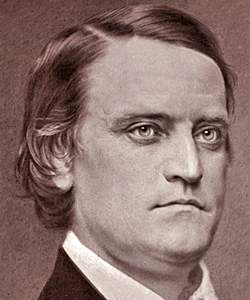John Cabell Breckinridge (Congressional Biographical Directory)
Reference
BRECKINRIDGE, John Cabell, (grandson of John Breckinridge, father of Clifton Rodes Breckinridge, and cousin of Henry Donnel Foster), a Representative and a Senator from Kentucky and a Vice President of the United States; born at ‘Cabell’s Dale,’ near Lexington, Ky., January 16, 1821; attended Pisgah Academy, Woodford County, Ky.; graduated from Centre College, Danville, Ky., in 1839; later attended the College of New Jersey (now Princeton University); studied law in the Transylvania Institute, Lexington, Ky.; admitted to the bar in 1840; moved to Burlington, Iowa, but soon returned and began practice in Lexington, Ky.; major of the Third Kentucky Volunteers during the Mexican War in 1847 and 1848; member, State house of representatives 1849; elected as a Democrat to the Thirty-second and Thirty-third Congresses (March 4, 1851-March 3, 1855); was not a candidate for renomination in 1854; was tendered the mission to Spain by President Franklin Pierce, but declined; elected Vice President of the United States in 1856 on the Democratic ticket with James Buchanan as President; unsuccessful candidate for President in 1860; elected to the United States Senate and served from March 4, 1861, until expelled by resolution of December 4, 1861, for support of the rebellion; entered the Confederate Army during the Civil War as brigadier general and soon became a major general; Secretary of War in the Cabinet of the Confederate States from January until April 1865; resided in Europe until 1868; returned to Lexington, Ky., and resumed the practice of law; vice president of the Elizabethtown, Lexington Big Sandy Railroad Co.; died in Lexington, Ky., May 17, 1875; interment in Lexington Cemetery.
"Breckinridge, John Cabell," Biographical Directory of the United States Congress, 1774 to Present, http://bioguide.congress.gov/scripts/biodisplay.pl?index=b000789.
John Cabell Breckinridge (American National Biography)
Scholarship
A friend and confidant of both President Franklin Pierce and the Illinois senator Stephen Douglas, Breckinridge was one of the congressional intermediaries who convinced Pierce to accept southern demands that Douglas's bill for organizing the Kansas and Nebraska territories include the statement that the Missouri Compromise restriction on slavery was "inoperative and void." Breckinridge also played a key role in securing approval of Douglas's bill in the House. Until this point he had been viewed as a moderate from the Border South on the slavery issue. Hereafter, although Breckinridge still tried to be a sectional mediator, he was associated with the extreme demands of the Lower South. When the Kansas-Nebraska Act passed in 1854, it triggered a storm of protest in the North that spawned the Republican party. Although he sponsored little in the way of major legislation, Breckinridge was a popular congressman whose charm and affability won him many friends. This popularity, combined with his representation of a key border state that traditionally had voted for the Whigs in presidential elections, gained him the Democratic nomination for vice president in 1856. The Buchanan-Breckinridge ticket carried Kentucky and the election. Breckinridge's service as vice president, however, was even less distinguished than his congressional record. He was virtually ignored by James Buchanan and shut out of the administration's policy decisions. It was with some relief that Breckinridge looked forward to entering the U.S. Senate, having been elected in 1859 by the Kentucky legislature to fill the seat to be vacated by John J. Crittenden in 1861.
William L. Barney, "Breckinridge, John Cabell," American National Biography Online, February 2000, http://www.anb.org/articles/04/04-00142.html.



